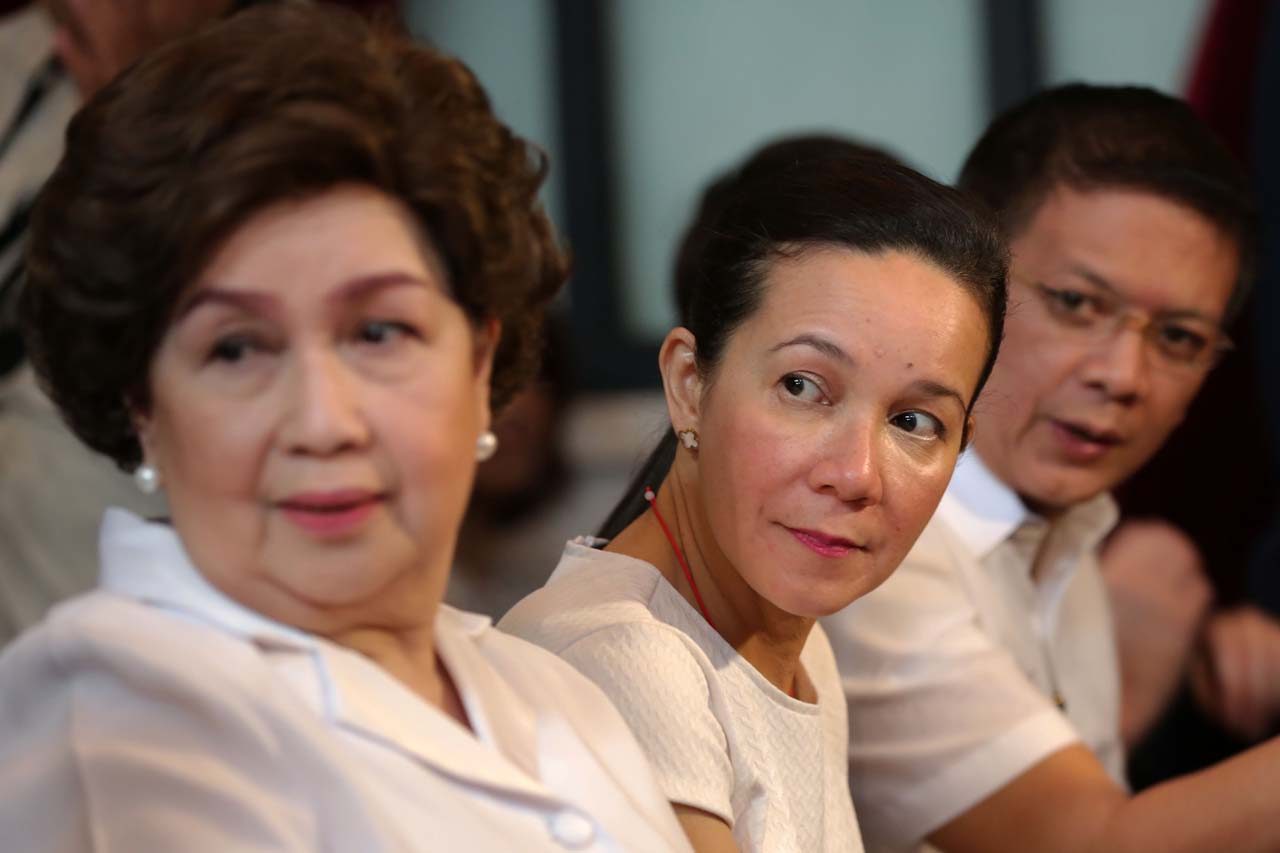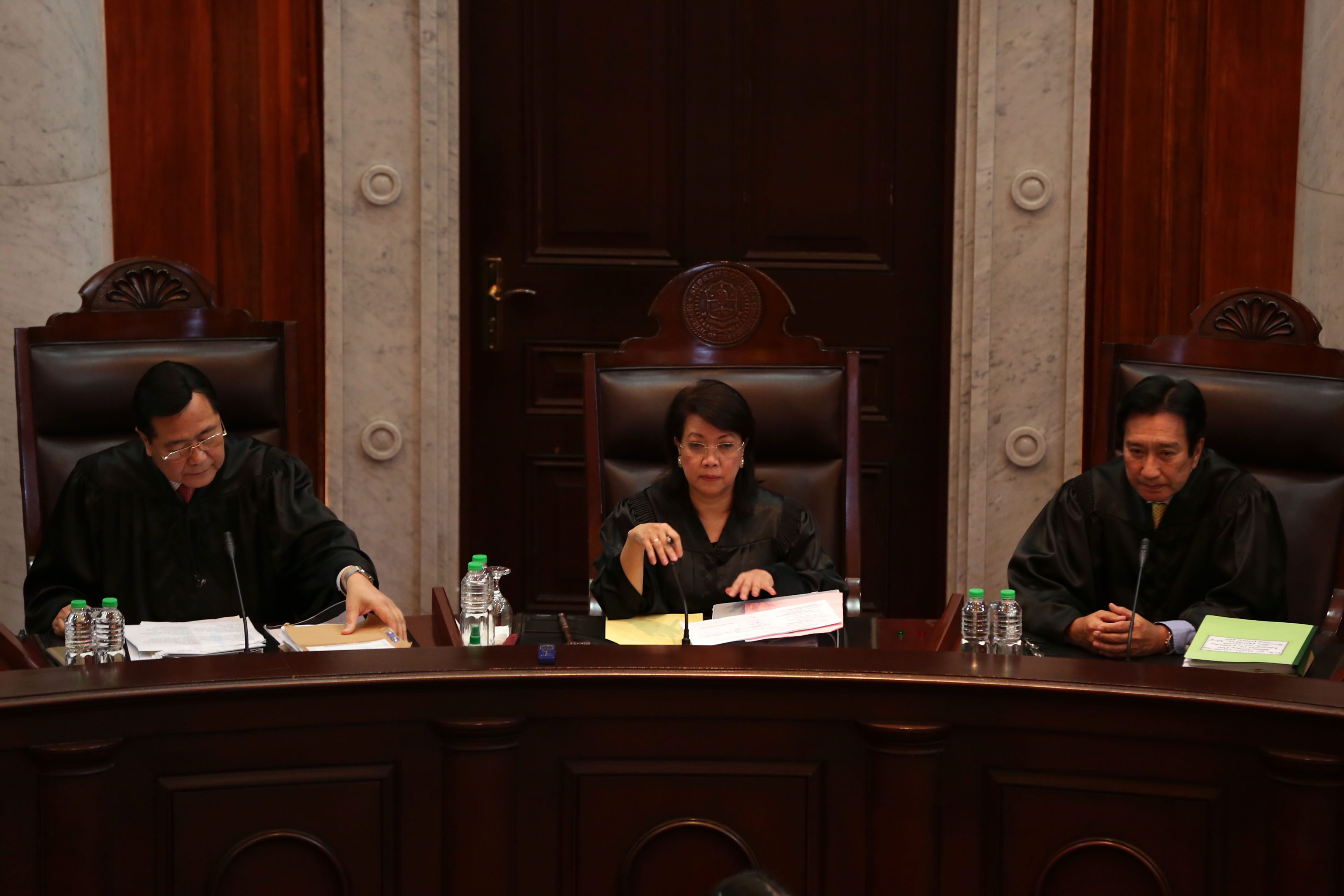SUMMARY
This is AI generated summarization, which may have errors. For context, always refer to the full article.

MANILA, Philippines – The residency of presidential candidate Grace Poe came under intense questioning from the Supreme Court justices in the first round of oral arguments Tuesday, January 19, raising doubts about whether she fulfills the 10-year residency requirement for those aspiring for the highest office in the country.
Poe has questioned before the Supreme Court the 2 Commission on Election (Comelec) rulings that said she deliberately misrepresented her residency and citizenship. The Comelec cancelled her certificate of candidacy (COC) and, in essence, said she is not a natural-born citizen and has lived less than 10 years in the Philippines.
Justice Mariano del Castillo, who is designated to write the decision, set the tone of the 3-and-a-half hour oral arguments when he probed Poe’s counsel, Alexander Poblador, on Poe’s intent to stay permanently in the Philippines after returning from the US in 2005, one of the key elements in determining residency, apart from physical presence and abandonment of foreign “domicile.” (Poe was a naturalized American citizen and lived there for about 17 years.)
Four things surfaced during Del Castillo’s series of questions:
1. Poe continued to use her US passport for 4 years even after she acquired a Philippine passport in 2006.
Poblador’s answer: As dual citizen, Poe used her US passport because it was “easier, for pragmatic reasons.”
2. Poe waited about 5 years after she returned to the country to renounce her U.S. citizenship.
Poblador’s answer: It was then that President Aquino appointed Poe as chair of the Movie and Television Review and Classification Board (MTRCB).
Del Castillo wondered: “If the President didn’t appoint her, she would not have renounced her U.S. citizenship?… Was she testing the waters? If things didn’t happen here as she wanted, would she have left?”
3. Poe came back to the country under the Balikbayan program, which grants a temporary 1-year (with extension) stay and did not secure a permanent visa for returning residents.
Poblador’s answer: Under R.A. 9225, the law on dual citizenship, there is no need for permanent visa for returning residents.
4. In one of her travels using her US passport, she departed from the country on Nov. 15, 2009 and returned on the same day, according to Poe’s petition submitted to the Court.
Poblador appeared not to be aware of this.
Immigrant visa
Justice Antonio Carpio picked up the thread on the type of visa Poe availed herself of when she returned to the Philippines, showing a slide of a Bureau of Immigration form for a “non-quota immigrant visa of a former Filipino citizen naturalized in a foreign country.”
This visa, according to the bureau’s website, is meant for “a) previously natural-born citizens of the Philippines; (b) naturalized citizens of a foreign country; and (c) [who] intend to return to the Philippines for permanent residence.”
Since Poe did not acquire such visa, Carpio also wanted to know if she applied for an alien certificate of registration (ACR), pointing out that Republic Act 562 or the Alien Registration Act required such.
Again, Poblador’s answer was no.
Likewise, Justices Estela Perlas-Bernabe and Teresita Leonardo-de Castro pursued the point of the “temporary nature” of Poe’s return to the country.
Poblador explained that Poe’s intent to permanently reside in the Philippines could not be accomplished in a “single act” but rather it was an “incremental process” that culminated in July 2006 when she took her oath of allegiance to the country.

The defense of physical presence in the country starting May 2005 – when Poe started to buy properties here – appeared to weaken under the withering scrutiny of some justices. “She arrived as a foreigner,” Del Castillo, at one point, remarked.
“Either Poblador was evasive or he didn’t have all the facts,” lawyer Zenaida Elepaño, who was at the oral arguments, observed. Elepaño is former Supreme Court administrator and now sits with the Legal Education Board, representing the Integrated Bar of the Philippines. “The defense didn’t appear to be strong.”
‘Presumption of law’
Del Castillo, Carpio, and De Castro asked questions on Poe’s legal basis for claiming she is a natural-born citizen. Del Castillo and Carpio were forthright and methodical in eliciting responses while De Castro was argumentative and needled Poblador no end.
Poe’s counsel used “presumption of law” as his main argument, citing international law and the Supreme Court rule on adoption.
“Are you advocating citizenship by presumption?” Del Castillo asked at some point.
Carpio called Poblador’s attention to the latter’s petition which omitted the portion of the 1934 constitutional convention deliberations wherein the amendment to include “foundling” among the natural-born citizens was rejected. Flashed on 2 screens in the Supreme Court session hall and highlighted in yellow were the parts Poblador did not cite.
Carpio said Poblador missed out on the “most important” part of the discussion. But Poblador said what was more significant was the intent of some participants to include “foundling” in the list of who qualified to be natural-born citizens.
Carpio’s and De Castro’s arguments that Poe does not qualify to be a natural-born citizen are laid out in their dissents in the Senate Electoral Tribunal decision.
The oral arguments ended with Justice Marvic Leonen taking the cudgels for Poe, saying the interpretation of the facts on her citizenship should be with the view to dispense justice and not be anchored on purely legalistic concepts.
He was leading to the position that the Court defer to the political process of suffrage – that the people through the ballot decide Poe’s fate.
The justices are expected to have a robust debate on the issue of foundling and citizenship as it is their first time to deal with such a case. More of their thinking will be revealed in the succeeding oral arguments.
The next one is scheduled on Tuesday, January 26. – Rappler.com
Add a comment
How does this make you feel?
There are no comments yet. Add your comment to start the conversation.